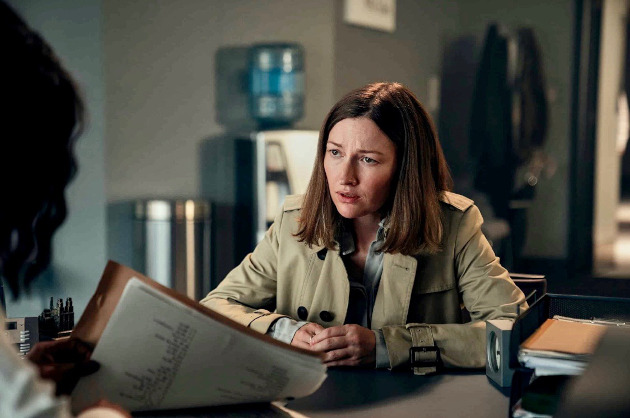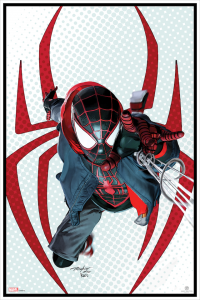I Came By (2022) is a suspense thriller filled with stops and starts. As soon as we get a sense of where things are going, the momentum halts in midstride and doubles back. One could argue that this is due to the narrative throwing us for a loop, inserting twists to keep us on our toes. But it doesn’t feel that way. We have a story that never really gets going. There are scenes of legitimate tension, but it all builds towards an ending that is incomplete. Have you ever had dinner with a friend that would look over the menu multiple times but can’t come to a decision on what to eat? This is the cinematic equivalent of that.
Director Babak Anvari (who cowrites with Namsi Khan), lays a foundation that has plenty of potential. We meet Toby (George MacKay) a graffiti artist who – along with his friend Jay (Percelle Ascott) – breaks into the homes of the upper class to spray paint the words “I Came By” on the walls. Toby and Jay make themselves out to be soldiers of the middle to lower classes, and that by defacing the homes of the one percent somehow proves they are all on the same level. But things are changing. Jay has decided to walk away from their line of work to concentrate on his family (a legitimate reason). Toby continues the fight, targeting the residence of prominent judge Hector Blake (Hugh Bonneville).

What Toby finds at Blake’s home is…well, I’ll leave that for you to find out. But that discovery informs everything else that follows – in good and bad ways. It is no surprise that Hector Blake is not who he appears to be. Underneath the distinguished and accomplished surface lies a person with deep dark secrets. Casting Bonneville is an inspired choice, as he balances a charming and unassuming persona against an evil that nearly reaches the depths of Don’t Breathe (2016). Blake is the extreme version of wealth and privilege, using his status as a judge to get away with just about anything. That makes him all the more dangerous. He is a villain with power and influence.
Things fall apart when we’re introduced to our protagonist…or should I say “protagonists?” We’re led to believe that Toby is our central character, until he is not. The point of view is flipped around so that we also follow the journey of Toby’s mother Lizzie (Kelly Macdonald) and Jay. Much is made of their relationships with Toby, and the increasing connection all three have with Blake. I’m being intentionally vague here, as Anvari and the rest of the production rely heavily on the surprises. Whether or not those surprises are worth the trip is a whole other story. What happens to Toby, Lizzie, and Jay take on a repetitive nature, as they conduct their own investigations into Blake. Matyas Fekete’s editing cuts the runtime in three equal parts, each one dedicated to a separate character. The problem is that we understand who Blake is right away. Every time we switche to a new character, we must wait for them to catch up.
The result is an imbalance the film never recovers from. Seeing each of the three diving headfirst into exposing Blake was like seeing moths circling a flame. What they are trying to do goes against any form of common sense. When things turn south, we can see it coming from a mile away. Toby, Lizzie, and Jay’s stubborn determination sacrifices their development as characters. While Jay may have the strongest backstory – involving the pressures he faces as a father – Lizzie and Toby are one note. That’s not to say that Macdonald and MacKay do not give dedicated performances. Macdonald brings warmth and compassion as the distressed mother, and MacKay gives Toby a twitchy, nervy energy. But their efforts go to waste as they are saddled with characters that make one bad decision after another.

The production design and art direction conceive Blake’s home as a reflection of his persona. On the outside, it looks like any other white-collar residence. Interiors suggest Blake as a man of culture and refinement. But further inspection reveals his sinister nature. Mundane objects, furniture, and paintings take a whole different meaning when we learn more about its owner. The lower floors are like a decent into a house of horrors, where hidden rooms and trap doors lead us down on dark path. At the very least, the set dressing was fun to look at. Blake’s home is reminiscent of other movie monster locations, such as Buffalo Bill’s lair in The Silence of the Lambs (1991) or the Bate’s Motel in Psycho (1960).
I Came By works as a passing interest for fans of thrillers. It’s not the greatest example of the genre, but neither is it the worst. The plot structure and themes don’t hold up beyond a surface level, but a lot of that is offset by the visual aesthetics as well as Hugh Bonneville’s creepy, effective performance.
The post Film Review – I Came By written by Allen Almachar appeared first on The MacGuffin: Film and TV Reviews, Interviews, Analysis.



